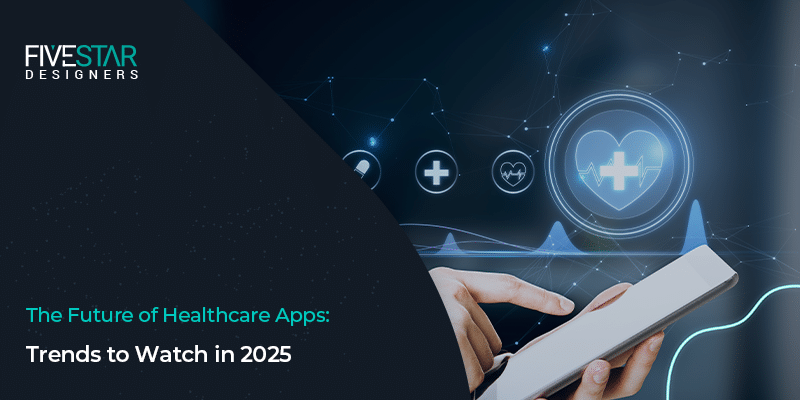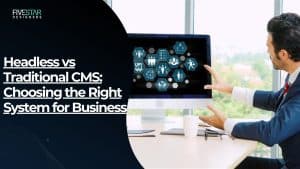Healthcare technology is increasing rapidly, and mobile apps are making a significant role in transforming patient care, hospital management, and medical research. With the technological advancements and user requirements in mind, let us overview the future of technology healthcare applications with emerging technologies as we step into 2025. Here are some key trends to watch for:
AI-Powered Healthcare Assistants
Enhancing Diagnostics and Patient Interactions
Healthcare applications of artificial intelligence (AI), i.e., a computing system that mimics human capabilities, are transforming the way we approach diagnostics, treatment plans, and how we interact with patients. AI-powered chatbots and virtual assistants deliver real-time responses, book appointments and even assess symptoms to deliver possible diagnoses. Innovative AI-powered healthcare experiences are expected to be more personalized by 2025.
Key Features:
- AI-powered chatbots for 24/7 patient support
- Faster and more accurate diagnostics
- Personalized treatment recommendations
- Reduced administrative burden on healthcare professionals
Telemedicine & Remote Patient Monitoring
The Growth of Virtual Healthcare
Telemedicine plays a fundamental role in modern medicine and has not stopped developing. Healthcare industry apps would embed advanced remote monitoring tools to track the real-time life signals of the patients such as heart rate, blood pressure, and glucose levels. Integration with wearable devices will further enhance remote treatment.
Key Features:
- Real-time health monitoring with wearables
- Decreased hospital visits and wait times
- Enhanced access for rural and underserved communities
- Smooth doctor-patient video consultations
Blockchain for Data Security & Privacy
Protecting Medical Records with Decentralization
Blockchain technology is set to revolutionize the protection of medical records as patient data security is increasingly brought to the forefront. These networks will improve accessibility and have decentralized, tamper-proof databases that ultimately increase trust and transparency while ensuring HIPAA and GDPR compliance.
Key Features:
- Enhanced data security and encryption
- Improved patient data ownership and privacy
- Secure medical record sharing between providers
- Reduced fraud and data breaches
Augmented Reality (AR) & Virtual Reality (VR) in Healthcare Apps
Improving Training and Patient Education
AR and VR will start to really become part of healthcare apps for better medical training, patient education as well as remote surgeries. Surgeons can rehearse complex procedures in a virtual environment, while patients can gain better insights into their ailments through immersive representations of their anatomy.
Key Features:
- Interactive 3D models for patient education
- Hands-on training simulations for medical professionals
- Virtual therapy and rehabilitation solutions
- Enhanced precision in surgical planning
Internet of Medical Things (IoMT)
Real-Time Health Monitoring & Predictive Analytics
With smart medical devices, wearables, and interconnected sensors, health can now be tracked and analyzed for prediction purposes in real time. The very shape of health care, as we know it, will soon be transformed by the Internet of Medical Things (IoMT), which will gradually be introducing mobile applications in medicine, for example in the health care of both the physician and patient so that both can monitor health metrics and early markers of possible medical issues-another dream come true.
Key Features:
- Continuous monitoring of chronic conditions
- Instant alerts for abnormal health readings
- Reduced emergency visits through early intervention
- Better decision-making with predictive analytics
Personalized & Predictive Healthcare
Leveraging AI & Big Data for Customized Treatment
Artificial intelligence and big-data technologies will facilitate the proper tailoring and designing of a treatment plan to fit an individual. Predictive models will support the establishment of health-related risks that health providers will be able to visualize and then take preemptive measures, thus reducing the need for assessing populations at health facilities and minimizing medical costs.
Key Features:
- Personalized treatment and medication regimens
- Prevention of diseases by predictive analytics
- Enhanced patient engagement and compliance
- Reduced healthcare expenditures and better outcomes
Voice-Enabled Healthcare Apps
The Rise of Hands-Free Medical Assistance
In recent times, intelligent assistants, such as Alexa and Google Assistant, have gained acceptance thus, voice interface systems in healthcare applications are expected to become common. Voice commands will let patients schedule and manage appointments, remind them to take medications, or monitor health alerts without them having to lift a finger.
Key Features:
- Hands-free interaction for disabled and elderly patients
- Faster access to health data
- Increased patient interaction with voice reminders
- Integration with smart home healthcare devices
Mental Health & Wellness Apps
AI-Driven Therapy & Digital Well-Being Support
There exists a growing demand for mental health support, and healthcare apps are stepping in. Expect an influx of AI-driven therapy bots, mood-tracking apps, guided meditation platforms, and therapeutic integrations targeting mental health in the near future.
Key Features:
- 24/7 mental health support through AI chatbots
- Personalized meditation and stress-relief programs
- Easy access to licensed therapists via video calls
- Data-driven mood tracking for mental well-being
Smart Medication Management
Enhancing Adherence with AI & Smart Pill Dispensers
Non-adherence to medications is a problem, and AI-based reminders, smart pill dispensers, and real-time alerts can help in improving these levels of adherence. Med apps will introduce smart medication tracking systems to keep patients on their schedule.
Key Features:
- Automatic reminders and alerts for medications
- Smart pill dispensers with dose monitoring
- Notifying family and caregivers for missed doses
- AI-based medication adherence analytics
5G-Powered Healthcare Solutions
Enabling Faster & More Reliable Telemedicine Services
The rollout of 5G will allow superfast and more reliable healthcare services such as high-definition video consultations, instant transfer of data, and live remote surgeries. Low-latency networks will further improve telemedicine experience for healthcare apps.
Key Features:
- Ultra-faster, high-definition video consultations
- Secure and instant data transfer of big medical files
- Low latency for remote robot surgeries
- Enhanced connectivity for IoMT devices
The Evolution of Patient-Centric Digital Healthcare
Technology continues to evolve the healthcare landscape with mobile apps proving to be a game changer for accessibility, efficiency, and patient outcomes. The abovementioned trends provide merely a glimpse into the many splendid things that await in 2025. The future of healthcare apps will surely be smarter, better connected, and more patient-centric.



